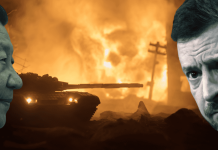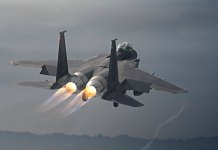Russia has reportedly developed a sophisticated system capable of robotizing both tanks and infantry fighting vehicles, according to Russian News Agency TASS.
Scientists at Rostec, a prominent Russian industrial cooperation specializing in electronics, weapons, and aviation, have created the Prometheus hardware and software complex.
This innovative system can transform various types of military vehicles, including infantry fighting vehicles (IFVs), armored personnel carriers (APCs), and tanks, into remotely controlled robotic vehicles.
In an interview with TASS, Bekhan Ozdoev, the industrial director of the state corporation’s weapons, ammunition, and special chemicals cluster, discussed the Prometheus hardware and software complex and its capabilities.
Ozdoev mentioned that the robotic infantry fighting vehicle equipped with the Sinitsa combat module, developed by the All-Russian Research Institute Signal, a subsidiary of Rostec, demonstrated exceptional control capabilities and operational efficiency when operated remotely from a control console.

Ozdoev further explained that Rostec has gone beyond previous advancements and developed the Prometheus hardware and software complex, which can transform various types of vehicles, including wheeled and tracked ones, into robotic vehicles.
This includes infantry fighting vehicles, armored personnel carriers, and even tanks.
The control is achieved through remote control systems while maintaining the original crew seating arrangement. Ozdoev further mentioned that only minor modifications to the combat vehicles are necessary to enable their integration with the complex.
He also added that the project is progressing towards enhancing autonomy. In the future, the combat vehicle can navigate along predetermined coordinates without direct operator involvement, reaching designated positions independently.
Moreover, the machine equipped with the Prometheus complex can autonomously discern the most suitable route, evade obstacles, and swiftly process information using advanced technical vision.
Robotic BMP-3 Infantry Fighting Vehicle
The representative of the state corporation noted that the integration of Prometheus with cutting-edge fire control systems would yield a formidable force comparable to a “real terminator.”
This highlights the potential for an advanced combat vehicle demonstrating enhanced autonomy and formidable combat capabilities. As mentioned earlier, Moscow has already successfully built a robotic infantry fighting vehicle integrated with the Sinitsa combat module.
The BMP-3 robotic infantry fighting vehicle, equipped with the Sinitsa module, was jointly developed by Kurganmashzavod and VNII Signal, both of which are subsidiaries of the High-Precision Complexes holding.
The vehicle has undergone testing in conjunction with lightweight robots designed for various tasks such as surveillance, target demolition, cargo transportation, and casualty evacuation.
This advanced vehicle was showcased at the Army-2022 forum. A specialized set of equipment enabled the automation of driver and gunner functions while retaining the manual control option.

The prototype of the robotic infantry fighting vehicle with the Sinitsa combat module was first unveiled in 2021. Built upon a tracked chassis, the vehicle features a powerful V-shaped engine called UTD-19, boasting 500 horsepower.
The manufacturer has claimed that the unmanned version of the BMP-3 can traverse ditches as wide as 2.5 meters.
Previously, Rostec had made assurances regarding the technical specifications of the armored vehicle. They had promised a maximum speed of 70 km/h and a fuel tank capacity of 700 liters, resulting in an estimated range of 600 km without the need for refueling.
However, any potential changes or updates to these technical specifications remain unknown. The vehicle is equipped with a 30mm 2A72 automatic cannon, a 7.62mm PKTM machine gun, and a 100mm 2A70 gun capable of launching anti-tank guided missiles (ATGMs).
The distinguishing feature of the latest module compared to earlier versions is the state-of-the-art panoramic sight. This advanced sight incorporates a thermal imaging channel, enabling a comprehensive 360º view day and night.
Also, the robotic BMP-3 is fitted with an automated loading mechanism, a digital fire control system, and electric controls, which could be handled using a remote control system.
This feature allows the vehicle to be deployed in hazardous and challenging situations where the risk to human personnel is deemed excessively high.
Furthermore, the advancements made by enterprises under the State Corporation’s umbrella pave the way for the robotization of other existing equipment models, resulting in significant cost reductions and rendering these projects highly promising for the Russian army.
- Contact the author at ashishmichel(at)gmail.com
- Follow EurAsian Times on Google News




